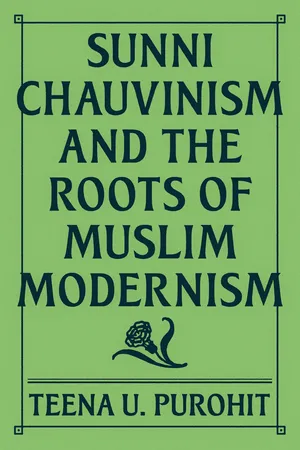
- 244 pages
- English
- ePUB (mobile friendly)
- Available on iOS & Android
Sunni Chauvinism and the Roots of Muslim Modernism
About this book
Muslim intellectuals who sought to establish the boundaries of modern Muslim identity
Muslim modernism was a political and intellectual movement that sought to redefine the relationship between Islam and the colonial West in the late nineteenth and early twentieth centuries. Spearheaded by Muslim leaders in Asia and the Middle East, the modernist project arose from a desire to reconcile Islamic beliefs and practices with European ideas of secularism, scientific progress, women’s rights, and democratic representation. Teena Purohit provides innovative readings of the foundational thinkers of Muslim modernism, showing how their calls for unity and reform led to the marginalization of Muslim minority communities that is still with us today.
Sunni Chauvinism and the Roots of Muslim Modernism offers fresh perspectives on figures such as Jamal al-Din al-Afghani, Muhammad Abduh, Muhammad Iqbal, and Abul A’la Mawdudi. It sheds light on the exclusionary impulses and Sunni normative biases of modernist Muslim writers and explores how their aim to unite the global Muslim community—which was stagnant and fragmented in their eyes—also created lasting divisions. While modernists claimed to represent all Muslims when they asserted the centrality and significance of unity, they questioned the status of groups such as Ahmadis, Bahais, and the Shia more broadly.
Addressing timely questions about religious authority and reform in modern Islam, this incisive book reveals how modernist notions of Islam as a single homogeneous tradition gave rise to enduring debates about who belongs to the Muslim community and who should be excluded.
Frequently asked questions
- Essential is ideal for learners and professionals who enjoy exploring a wide range of subjects. Access the Essential Library with 800,000+ trusted titles and best-sellers across business, personal growth, and the humanities. Includes unlimited reading time and Standard Read Aloud voice.
- Complete: Perfect for advanced learners and researchers needing full, unrestricted access. Unlock 1.4M+ books across hundreds of subjects, including academic and specialized titles. The Complete Plan also includes advanced features like Premium Read Aloud and Research Assistant.
Please note we cannot support devices running on iOS 13 and Android 7 or earlier. Learn more about using the app.
Information
Table of contents
- Cover
- Title Page
- Copyright
- Contents
- Acknowledgments
- Note on Spelling and Transliteration
- Introduction
- 1. Jamal al-Din al-Afghani, Sayyid Ahmad Khan, and “Neicheri” Transgression
- 2. Muhammad ʿAbduh, Rashid Rida, and Bahai “Esotericists”
- 3. Muhammad Iqbal on the Question of Ahmadi Exclusion and Ismaili Inclusion
- 4. Abul Ala Mawdudi’s Islamic State and Minority Ahmadis
- 5. Postcolonial Legacies of Modernist Tawhid: A Quest for Justice and the Nation-State
- Notes
- Bibliography
- Index